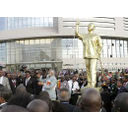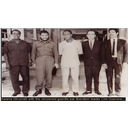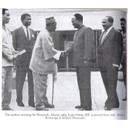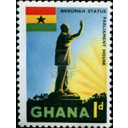Ghana and Pan-Africanism
On the eve of Ghana's independence, Nkrumah declared that 'the independence of Ghana is meaningless unless it is linked up with total liberation of the African continent". By liberation he did not mean merely political independence for forty or so mostly small states, but their union into a single African state, large enough and powerful enough to seek economic liberation from Western neo-colonialism.

He believed that economic neo- colonialism on the part of the European and North American exploiters could be broken by political pan-Africanism on the part of the African exploited. Thus pan-Africanism was the cardinal principle of Nkrumah's foreign policy in Africa in the period after 1957. Nkrumah was not just a theorist; he took bold but practical steps towards African unity.
He convened pan-African conferences in Accra, such as the Conference of Independent African States in April 1958, the first in a chain of such conferences which ultimately led to the creation of the Organization of African Unity (OAU) in 1963, though Nkrumah felt the OAU was too weak to unite Africa effectively.

Madame Fathia, Shirley Graham, W.E.B. Du Bois, and Ghana’s first President Kwame Nkrumah on his 95th birthday in Ghana on February 23, 1963.
The All-African Peoples' Conference held in Accra in December 1958 was attended by representatives of 62 nationalist organizations in 28 African countries. The conferences had immense symbolic value. In the words of Tom Mboya, they 'marked the rediscovery of Africa.10
But the conferences had a practical value too. The All-Africa Peoples' Conference inspired liberation movements throughout the continent, as delegates returned home to fight colonialism, often aided by grants from the Ghanaian government. Another practical step on the road to African unity was the formation of the Ghana-Guinea Union in 1958.
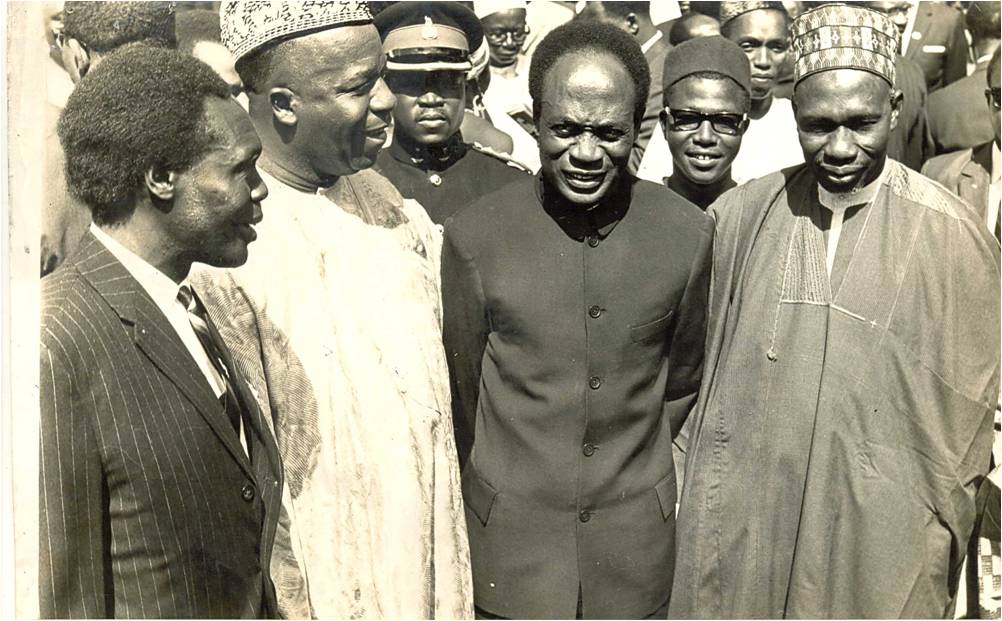
Alhaji Sir Abubakar
Tafawa Balewa (right) in stately glamour, charms other African brother heads of
government. On his right is Dr. Kwame Nkrumah, far the right is Dr Siaka
Stevens of Sierra Leone. On the left is Dr Sekou Toure of Guinea. Behind them
are their retinue if aides.
Paradoxically, however, Nkrumah became the main obstacle to unity in Africa. In his fanatical adherence to the idea of a Union Government of all Africa and his opposition even to regional groupings as "just another form of balkanization' he alienated other African Heads of State in the early 1960s.
Other presidents looked askance at Nkrumah's scarcely concealed ambition to become President of Africa and were alarmed by his financial support of dissident movements in a number of French-speaking countries. Ghana became a sanctuary and a haven for rebels from francophone Africa. Nkrumah was convinced that most of his neighbours were under 'puppet regimes' controlled by President Charles de Gaulle of France.
Who was Kwame Nkrumah?
Dr Nkrumah was one of the outstanding African Nationalists and statesmen. He was born on 18, September 1909 in Nkroful village in Southwestern Ghana. His father was a blacksmith of the Nzima clan. Though uneducated, he wanted Nkrumah to study and have more education than he would get at home.

Osagyefo Dr Kwame Nkrumah (21 September 1909 – 27 April 1972), P.C., was the leader of Ghana and its predecessor state, the Gold Coast, from 1951 to 1966. Overseeing the nation's independence
from British colonial rule in 1957, Nkrumah was the first President of Ghana and the first Prime Minister of Ghana. An influential 20th-century advocate of Pan-Africanism, he was a founding member of the Organization of African Unity and was the winner of the Lenin Peace Prize in 1963.
Nkrumah was educated in a catholic missionary school, Achimota College and a Teacher Training College in Accra. After he completed his training, Nkrumah started teaching at the Roman Catholic Junior School in 1930. He was promoted to be a head teacher of a Junior School at Axim. Though working at that time, he wanted to continue with his studies abroad.

By 1935, he had saved enough money for further education. He went to the US where he studied theology, sociology, philosophy, economics and education. At Lincoln and at the University of Philadelphia, Nkrumah obtained a Bachelor of Theology degree, a Master of Science degree in Education and a Master of Arts degree in Philosophy. He made a particular study of the history of African people and the colonial masters. This enabled him to fight colonialism in Africa later.

As a student in America, Nkrumah began to write his first book entitled Towards Colonial Freedom which was published in 1945 with emphasis that Europeans came to Africa to exploit the resources but not to develop Africa. He called upon Africans to work together to free themselves.
While in US, Nkrumah experienced a high level of discrimination of black people. This experience made him more determined than ever before to free Africa from foreign rule. For he believed that when Africa is free, then Africans wherever they live, will be respected.
In May 1945, Nkrumah left the US for England where he studied law at the London School of Economics. But he spent most of his time in political work.
He became vice president of West African Students Association (WASA) that discussed problems facing Africans and got solutions.
It was in England that he helped his friend George Padmore, from West Indies in the organization of the 5th Pan African Conference held in Manchester in October 1945. Its purpose was to link all movements and groups seeking to end colonial rule in order come up with best way of achieving independence. Over 200 people from Africa and the diaspora attended.
After his return to Ghana in 1947, he served as secretary to a political party called United Gold Coast Convention (UGCC). As a son of a peasant he found it easy to speak to the ordinary people and to organize them.
In 1948, he broke away from UGCC. The reason was that UGCC was slow in action and was an elite party. He formed his own political party called Convention People's Party (CPP). This was mass party that had support all over the country.
As the head of CPP, Nkrumah advocated for "Independence now" and the policy of positive action in order to attain political freedom. Because of this action the Governor ordered for his arrest.
He was imprisoned in 1950 and elections were carried out in 1951. Despite being in prison, Nkrumah continued to run his party, which became victorious. He was elected Member of Parliament for Accra Central.
He was released on 12th February 1951 after a year's imprisonment and he became the first African leader of government. The governor asked him to form a cabinet of 8 people although more power was in the hands of British still.
On March 5, 1952, he was named the first Prime minister of Gold Coast. As a Prime Minister of Gold Coast, he speeded up preparation for total independence. In July 1953, he made a very powerful speech, which was called the Motion of destiny in which he wanted the British to name date for Ghana's independence.
Again in 1954, because the British wanted the people to elect more representatives to Parliament and also to decide whether the people supported the Destiny motion, another general election was conducted where CPP again won with 72 out 104 contested seats.

Dr
Nkrumah in a swimming mood
There were some people who opposed the activities of CPP. Because of this, the British ordered for another general election in Ghana to show definitely that people of Ghana wanted CPP to lead them to independence. Once again CPP won a clear victory in this election held on 17th July 1956
After these elections, Gold Coast became independent on March 6, 1957 with Nkrumah as the first black president, South of the Sahara. After more than 100 years of British rule the new state was renamed Ghana.
He became a prominent Pan Africanist who was determined to unite the whole Africa in the formation of United States of Africa. To this effect, he organised conferences for the independent African states in 1958 in Ghana called the APC (African People's Conference). Six weeks after the conference ended, Kwame visited all countries, which had taken part. He wanted to see for himself how they were getting on with matters of African unity.
As an important step towards African unification, an agreement was signed between Nkrumah and Sekou Toure to form the Ghana-Guinea union in December 1958. Mali, which was headed by President Modibo Keita, followed this in April 1961.
While president, Ghana became very prosperous. It was the richest nation among the independent African Nations especially after the construction of the Volta dam project which Nkrumah himself commissioned. New roads were opened up, airports and harbours, hospitals, shops and offices were set up.
Education was promoted by setting up schools and training colleges in every part of Ghana. Several Universities were opened up at Legon, Kumasi and Cape Coast. All education from primary to university was made free. Textbooks and basic necessities were provided.


President of Ghana Kwame Nkrumah (1909 - 1972) with his wife Fathia Nkrumah (nee Rizk, 1932 - 2007), circa 1963
Industries increased in number, making goods such as cloth, soap, cement, shoes among others which previously had to be imported.
In 1963, he participated in the formation of OAU Adis Ababa, Ethiopia. The OAU united all African countries and condemned foreign rule.

Nkrumah was a socialist who believed that government was to control every thing in the state. This helped in developing all regions of the country by using the people of Ghana themselves.
He tried to create unity in the country by abolishing all political parties based on tribal basis. This however caused a lot of tension as many people were imprisoned and Nkrumah was accused of being a dictator.
On 24th February 1966, the army and the police with the special advice from the US overthrew Nkrumah. Major Kotoka, General A. Ankrah and Afrifa headed the army coup. This took place while Kwame was in Peking. He had left Accra on 21 February, and was on his way to Hanoi, the capital city of Vietnam at the invitation of President Ho Chi Minh.

After his overthrow, he flew to Russia, Algeria then to Guinea where he was made a co‑head of state by President Sekou Toure of Guinea and they led Guinea in conjunction.
He lived in comfort that made him to write books such Autobiography, Conscientism, Dark days in Ghana, Handbook of revolutionary warfare, Class struggle in Africa, Revolutionary path, Rhodesia file, Voice from Conakry among others.
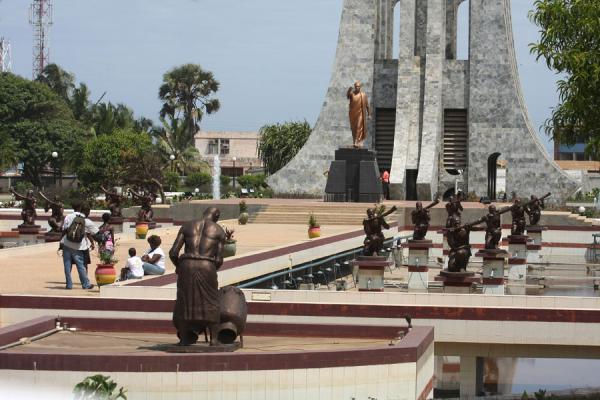
Nkrumah suffered from cancer and was taken to Bucharest, the capital city of Rumania for treatment. He died early in the morning of 27 April 1972 and two days later, his body was flown to Conakry and was given a presidential burial in Guinea. The body was later returned to Ghana in July the same year for burial at his home village at Nkroful.

National Movements and New States in Africa
